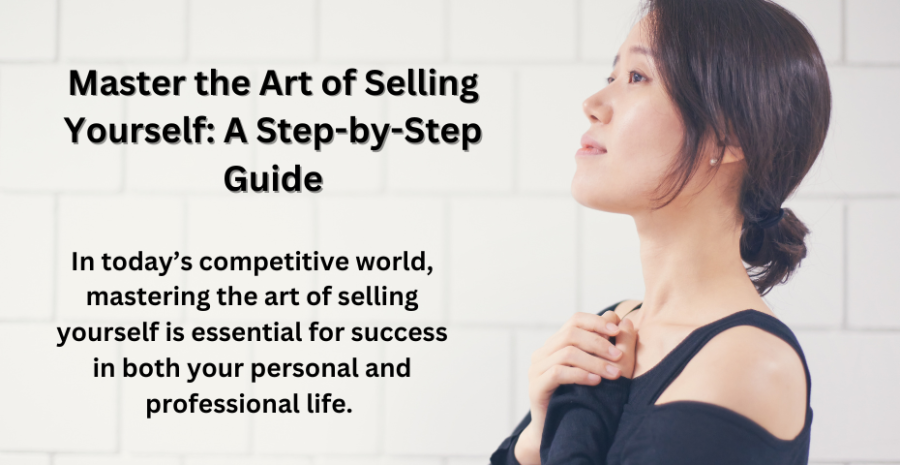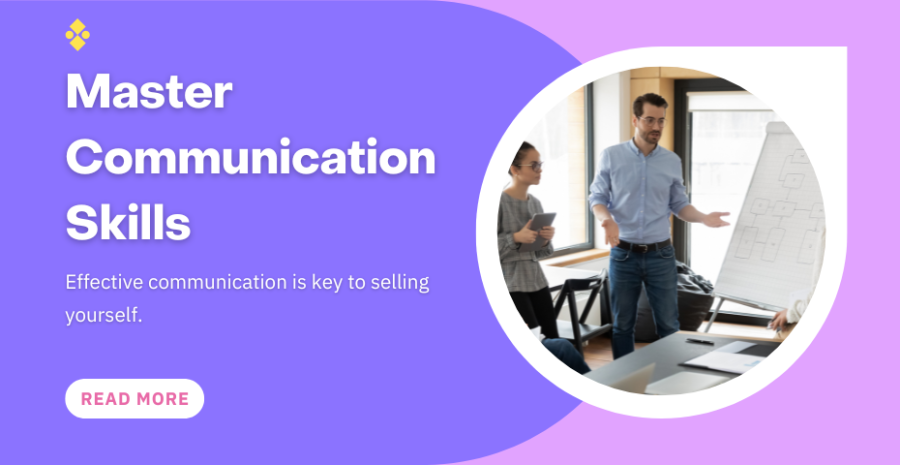

In today’s competitive world, mastering the art of selling yourself is essential for success in both your personal and professional life. Whether you're a job seeker, entrepreneur, freelancer, or even someone looking to expand their social circles, effectively presenting yourself is a valuable skill.
This guide aims to provide a step-by-step breakdown of how to market yourself confidently, create a lasting impression, and build authentic connections.
Selling yourself isn't about arrogance or false representation; it's about understanding your unique strengths, conveying them effectively, and aligning them with what others need.
Let’s dive into the ten essential steps to help you master this vital skill.

Before you can sell yourself, you need to know what you’re offering. Your value proposition is the unique combination of skills, experiences, and personal qualities that make you stand out.
Start by assessing your strengths, talents, and areas of expertise. What problems can you solve? What makes you different from others in your field?
Understanding these answers allows you to create a compelling narrative about who you are and what you bring to the table.
Remember, your value proposition isn't just about your qualifications but also the unique perspective or creative approach you can offer in any situation.

Your personal brand is how people perceive you when they interact with you. It’s the reputation and impression you build over time through consistent actions, appearance, and communication.
Developing a strong personal brand requires self-awareness, consistency, and authenticity. Begin by identifying how you want to be seen—do you want to be known for your leadership, creativity, problem-solving skills, or technical expertise?
Once you’ve established that, ensure your social media profiles, professional networks, and personal interactions reflect this image.
Be mindful of your tone, appearance, and behavior, as all contribute to shaping your brand.

An elevator pitch is a brief, persuasive speech that succinctly explains who you are, what you do, and what you’re looking for. It should be no longer than 30-60 seconds but powerful enough to capture the attention of your listener.
A well-crafted elevator pitch allows you to introduce yourself confidently in any situation, whether in a job interview, networking event, or casual conversation.
Focus on your most relevant experiences, key achievements, and how you can add value to the other person. Make sure it's conversational, not robotic, and practice until it feels natural.

In today’s digital age, having a strong online presence is crucial. This extends beyond just having social media accounts—it involves actively engaging with content that aligns with your personal brand, sharing thought leadership, and building connections within your industry.
Markethive and LinkedIn is particularly powerful for professional networking, but platforms like Twitter, Instagram, or a personal blog can also enhance your visibility.
Share insights, participate in discussions, and offer valuable content to show your expertise. The more active and authentic your presence online, the easier it becomes to build credibility and attract opportunities.

Networking is about building genuine relationships, not just collecting business cards or connections. To sell yourself successfully, you need to be strategic about networking.
Attend industry events, join online communities, and engage in conversations that matter to your field.
Approach networking with the mindset of offering value rather than seeking favors.
Ask insightful questions, be genuinely curious about others, and look for ways to help.
Building authentic relationships takes time, but the effort pays off in the form of trust, credibility, and opportunities that come from strong, genuine connections.

Effective communication is key to selling yourself. This includes both verbal and non-verbal communication. To be persuasive, you need to be clear, concise, and confident in how you present your ideas.
Practice active listening, engage with your audience, and be mindful of your body language—maintain eye contact, adopt an open posture, and use gestures that reinforce your points.
Your ability to connect emotionally with others through storytelling can also set you apart. People remember stories more than facts, so use anecdotes to highlight your strengths and make your message more relatable.
.png)
Confidence is attractive, but there’s a fine line between being confident and arrogant. Confidence comes from knowing your worth and being comfortable with it, while arrogance stems from overstating your value at the expense of others.
To walk this line carefully, focus on what you’ve achieved and how you can contribute rather than boasting about your accomplishments.
Be open to feedback, acknowledge areas where you need improvement, and demonstrate humility. A strong self-assured presence will make others gravitate toward you, but remember to balance it with a sense of respect for others.

Talk is cheap; action speaks louder. If you want people to buy into what you're selling, you need to show them through your actions. For example, if you’re a graphic designer, showcase a portfolio of your best work; if you’re in sales, present concrete results you’ve achieved in past roles.
Even in casual settings, demonstrate your problem-solving skills or leadership abilities through active participation. Showing instead of telling is far more effective at convincing others of your capabilities.
Be proactive and back your claims with tangible evidence of your skills and expertise.

Selling yourself is not a one-time event. To maintain the connections you’ve made, you need to follow up and nurture relationships over time.
After meeting someone, send a personalized follow-up message that references your conversation and expresses your interest in staying connected. Keep the relationship alive by periodically reaching out, sharing valuable resources, or congratulating them on achievements.
Remember, long-term success comes from cultivating relationships, not just making initial contacts. People are more likely to think of you for opportunities if you remain present in their professional network.
.png)
Finally, the key to mastering the art of selling yourself is continuous improvement. The world is constantly evolving, and staying relevant requires ongoing learning and self-development.
Invest in expanding your knowledge, acquiring new skills, and staying updated on trends in your industry. Self-reflection is equally important—regularly assess your performance, seek feedback, and make necessary adjustments.
This mindset of growth not only enhances your value but also shows others that you’re adaptable and committed to excellence. People are drawn to those who are always improving and staying ahead of the curve.
Mastering the art of selling yourself is a lifelong skill that goes beyond mere self-promotion. It involves understanding your unique value, building a compelling personal brand, and learning how to communicate your strengths effectively.
While each of the ten steps outlined in this guide plays a significant role in helping you position yourself for success, the key lies in authentic, consistent efforts.
By continuously refining your approach, staying humble yet confident, and fostering meaningful relationships, you can create opportunities that align with your aspirations.
Ultimately, selling yourself is about believing in your worth and articulating it in a way that resonates with the world around you.
.png)
About: Andries vanTonder
45 years selfemployed
He is a Serial Entrepreneur, an Enthusiastic supporter of Blockchain Technology and a Cryptocurrency Investor
Find me: Markethive Profile Page | My Twitter Account | My Instagram Acount | and my Facebook Profile.
